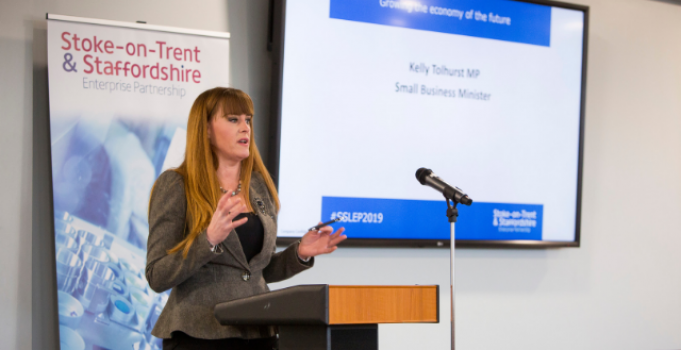
Small Business Minister’s speech to our LEP: read the full text here
Kelly Tolhurst MP: Opening Remarks
- Thank you, David, for inviting me to speak today.
- When I was appointed as Minister for Small Business, Consumers and Corporate Responsibility I was delighted to be asked to be the LEP growth champion for Stoke and Staffordshire.
- And after a busy few months I’m glad to have this opportunity to meet members of the LEP board, and to speak to so many important people from the area.
LEP Achievements
- So, although this is my first visit, I am well aware of the good that you are doing in driving forward economic growth.
- Government has committed more than £120 million of Local Growth Funding to the area, and it’s looking like great value for money. We’re already seeing some real returns:
- Here in East Staffordshire, a new access road and canal bridge at Branston Locks in Burton upon Trent has created a major development opportunity, which will see over two thousand new homes being built along with a fifty-acre employment site.
- The UK’s first District Heat Skills Academy at Stoke on Trent College is welcoming its first cohort of apprentices from local construction companies for training in the range of technologies that will power the city’s pioneering £50million District Heat Network this month.
- And I was pleased to hear about Gestamp relocating to the Four Ashes Business Park in South Staffordshire, thanks to the LEP investment in junction improvements to the A449.
- And there’s more good news to come. The City Deal between the LEP and Government, worth over £30 million, is making exciting progress, both with the Deep Geothermal District Heating Network in Stoke-on-Trent and the Smart Energy Network Demonstrator at Keele University.
- The success of the two Enterprise Zones continues, with more and more businesses choosing to take advantage of the support and opportunities on offer at Ceramic Valley.
- And your busy and proactive Growth Hub has helped over six thousand local companies find the support they need to grow their businesses.
LEP Review
- With all this great work going on here it shouldn’t be a surprise that LEPs are a key part of our Industrial Strategy – our plan to deliver strong local economies.
- A lot of the success of the Strategy will come down to having strong local institutions and strong local leadership.
- That’s why in July last year, we published a review of Local Enterprise Partnerships, which brought forward reforms to leadership, governance, accountability, financial reporting and geographical boundaries.
- We have to make sure that LEPs develop into a self-regulating sector with a culture of transparency and good governance, operating to the highest standards of accountability.
- After all, Government is asking LEPs to take on a lot, whether that’s through developing Local Industrial Strategies or maximising the impact of UK Shared Prosperity Funding in their area.
- So this is a challenging time for LEPs as they look to implement the reforms of the LEP review. But it is essential we ensure ongoing business and public confidence in LEPs.
UK Shared Prosperity Fund
- I have mentioned that LEPs will have a key role to play in delivering the UK Shared Prosperity Fund within England.
- This new fund is designed to raise productivity and reduce inequalities between communities across all four nations of the Union.
- We will publish a consultation shortly and welcome all views to shape our approach.
Local Industrial Strategies
- In the Industrial Strategy White Paper, and more recently in the LEP Review document, Government committed to Local Industrial Strategies led by LEPs.
- These will be long-term, based on clear evidence and aligned to the national Industrial Strategy. And they will be critical to increasing productivity and realising potential throughout the country.
- Initially, a few trailblazer areas were announced, followed by a second wave of LEP areas.
- Then, shortly before Christmas, Government announced that it will work with all remaining Mayoral Combined Authorities and LEPs to develop their Local Industrial Strategies.
- I know that work is already underway on your Local Industrial Strategy, and I’m looking forward to seeing what you come up with over this year, as we look to agree these Strategies by early 2020.
- We want to see strategies that build on specific, distinctive strengths to drive productivity while addressing the fundamentals of a local economy – what we call the foundations of productivity: Ideas, People, Infrastructure, Business Environment and Places.
- This will require a huge effort on all fronts: from LEPs, local stakeholders and government. On that front, I hope others will follow the example of Uttoxeter’s JCB, who, back in the summer, announced their plan to provide more than £50 million to fund their new plant in Staffordshire.
- JCB are a great company, and their investment demonstrates both the commitment business has to Staffordshire and the potential that exists here.
- Each of our cities, towns and rural areas have competitive advantages essential to shaping our economic future – and this will be the bedrock of strong local plans for prosperous communities in all corners of the country.
Industrial Strategy One Year On
- One year after the publication of our Industrial Strategy, we have seen good progress, with important achievements across each of the five foundations:
- We now have record levels of public investment in research and development;
- We have the fastest wage growth in nearly a decade and a record number of people are now in work;
- We have had major upgrades to our infrastructure, with spending up 10% in the last year, and Government and private sector investment totalling over £260 billion in 2018 so far;
- And we are delivering the biggest shakeup to technical education and retraining in a generation to make sure we have the skills we need.
- Alongside these five foundations are four Grand Challenges – four major changes sweeping through the world today.
- And they are four challenges which the UK can capitalise on.
- They are:
- Artificial Intelligence and Data;
- Clean Growth;
- The Future of Mobility; and
- An Ageing Society
- We have already announced four missions to focus attention on long-term targets, from five extra years of healthy life for all, to halving the energy use of new buildings.
- And we will continue to target these challenges in the years ahead, so that the UK is not only ready for what the future holds – it’s ready to shape the future.
Closing Remarks
- The Industrial Strategy is designed to secure our success, looking beyond our departure from the European Union to the future of the UK and the global economy.
- Strong, credible, effective Local Enterprise Partnerships are an essential part of this, and I’m hoping that we’ll see LEPs up and down the country doing all they can to support our goals.
- So my thanks to all of you for listening to me today, and for giving your time, energy, and expertise to helping this LEP meet the challenges ahead and making Stoke-on-Trent and Staffordshire a great place to live, work and invest.
Thank you.
Click here to see conference slides from:
Lorna Pimlott, HS2 Phase 2 sponsorship and policy director HS2
Alun Rogers, SSLEP vice chair Growing the future economy
(More presentations will be added shortly)


















